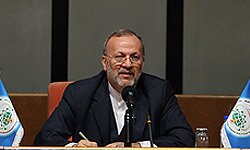Iranian FM, IGAD Secretary-General Discuss Solutions to Somali Crisis
 Bartamaha (Nairobi):- Iranian Foreign Minister Manouchehr Mottaki and Secretary-General of the Intergovernmental Authority on Development (IGAD) Mahboub Ma’alim discussed ways to resolve the ongoing crisis in Somalia. During the meeting held here in Tehran on Sunday, the two sides explored ways to help Somalia resolve the existing crisis and restore peace, security and tranquility in the African state.
Bartamaha (Nairobi):- Iranian Foreign Minister Manouchehr Mottaki and Secretary-General of the Intergovernmental Authority on Development (IGAD) Mahboub Ma’alim discussed ways to resolve the ongoing crisis in Somalia. During the meeting held here in Tehran on Sunday, the two sides explored ways to help Somalia resolve the existing crisis and restore peace, security and tranquility in the African state.
Mottaki lauded the efforts made by IGAD to solve the problem, and stated, “The Era of crisis, insecurity, war and instability of the Somali people as a historical and influential nation in eastern Africa should come to an end.”
He noted that further institutionalization of IGAD’s efforts and regional countries’ commitment can open a way out of the present crisis.
The Iranian minister added that the Somali people should take control of their country’s affairs and management.
Meantime, Mottaki renewed Iran’s preparedness to help resolve the crisis and establish peace and tranquility in Somali.
During the meeting, Ma’alim hailed Iran’s goodwill efforts to help resolve Somalia’s problems, and said, “We attach much value to the goodwill efforts of the Islamic Republic of Iran in utilizing its valuable experiences and high capacities for helping the IGAD region.”
The Iranian government has long sought to expand ties and cooperation with the Black continent.
Tehran is eager to expand and strengthen relations with African states more than ever, Ahmadinejad said at the start of a bi-nation tour of Africa in April 2010 which took him to Zimbabwe and Uganda.
Iran has been accepted as an observing member of the African Union and has shown an active presence in AU summit meetings.
The Intergovernmental Authority on Development (IGAD) in Eastern Africa was created in 1996 to supersede the Intergovernmental Authority on Drought and Development (IGADD) which was founded in 1986.
The recurring and severe droughts and other natural disasters between 1974 and 1984 caused widespread famine, ecological degradation and economic hardship in the Eastern Africa region.
Although individual countries made substantial efforts to cope with the situation and received generous support from the international community, the magnitude and extent of the problem argued strongly for a regional approach to supplement national efforts.
In 1983 and 1984, six countries in the Horn of Africa – Djibouti, Ethiopia, Kenya, Somalia, Sudan and Uganda – took action through the United Nations to establish an intergovernmental body for development and drought control in their region.
The Assembly of Heads of State and Government met in Djibouti in January 1986 to sign the Agreement which officially launched IGADD with Headquarters in Djibouti. The State of Eritrea became the seventh member after attaining independence in 1993.
In April 1995 in Addis Ababa, the Assembly of Heads of State and Government made a Declaration to revitalize IGADD and expand cooperation among member states.
On 21 March 1996 in Nairobi the Assembly of Heads of State and Government signed “Letter of Instrument to Amend the IGADD Charter / Agreement” establishing the revitalized IGAD with a new name “The Intergovernmental Authority on Development”.
The Revitalized IGAD, with expanded areas of regional cooperation and a new organizational structure, was launched by the IGAD Assembly of Heads of State and Government on 25 November 1996 in Djibouti, the Republic of Djibouti.
———————————-
Source:- Farsnews.
Comments
comments
 Calendar
Calendar




































